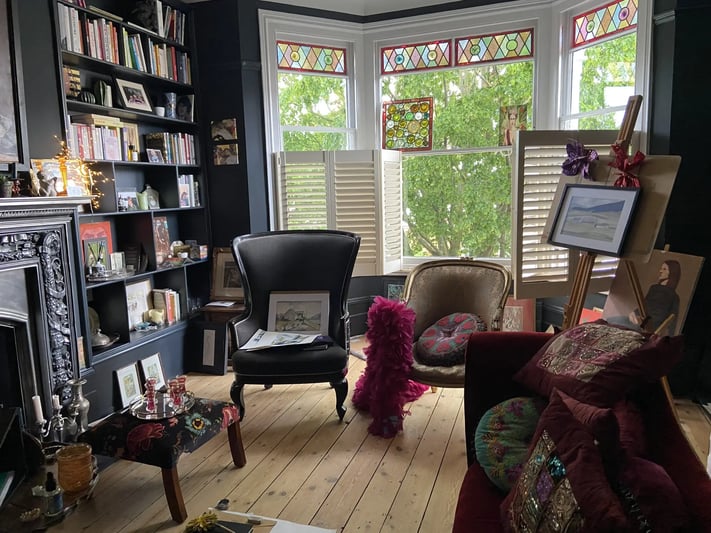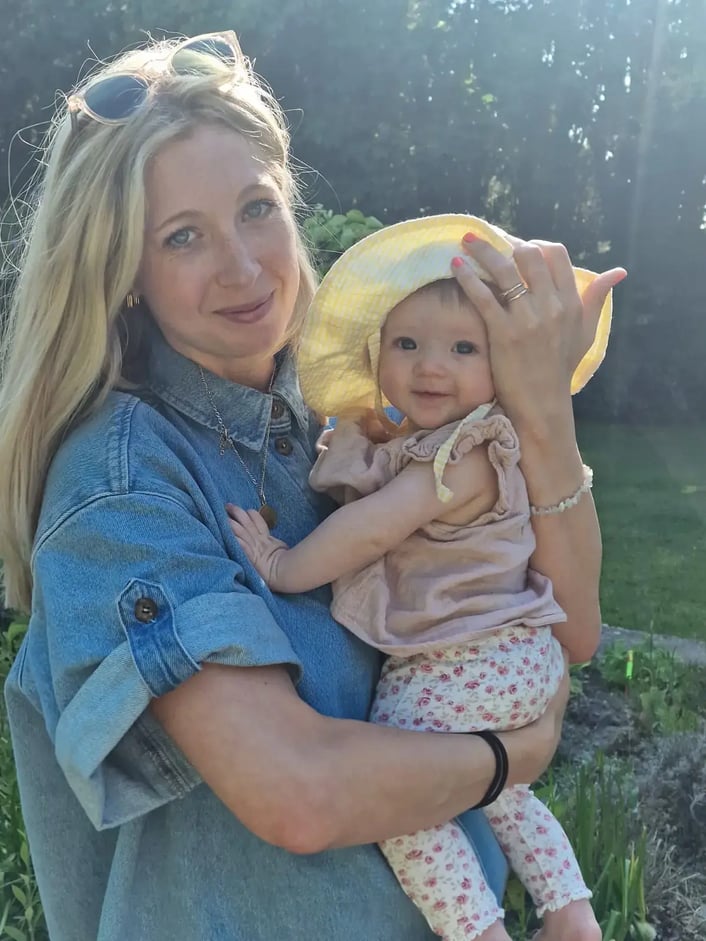When my son left home after a lovely couple of years staying with us again post Uni I decided (with “indecent haste” according to him) to convert his bedroom into my “women’s room”. To mark the end of my caring days I was going to indulge in much more me-time. It’s a lovely room filled with books and paintings, it’s got a fireplace and big bay windows and is absolutely perfect for getting creative. Now that working from home is far more common, I use it as my office too. But it turned out that my caring days weren’t quite over after all.
A new type of caring
Although, sadly, my dad died young at 51, my mum always looked and seemed 10 years younger than her actual age and was more like a friend than a mum. I planned that she would move in with me and my husband when she got older. She was great fun and very self-sufficient. I didn’t really worry at all about what might lie ahead. It still shocks me to write that my mum was taken by Covid-19 following a steady decline from Alzheimer’s. They say that pneumonia is the old man’s friend. Well, in this instance, Covid-19 was my mum’s friend and ours because Alzheimer’s was brutal.
No sooner were my husband and I empty nesters than this new caring phase arrived. I’m extremely fortunate to have 2 sisters and a brother whom I love dearly and could not have survived this ordeal without them. What happened in our case was that my brother, who is the youngest and the only one of us 4 siblings still living near my mum, took the brunt of the responsibility of looking after her. I feel sure that had my sisters and I been in Scotland that would have been quite a different scenario. So often the duty of care falls to the women in the family. Proximity changed that default setting.
Although the title of this article is about how to cope whilst caring for an ill parent, in my case, it’s really about managing emotions as my little brother did the heavy lifting with respect to the day-to-day care of my mum. But of course, one’s energy supply is hugely dictated by emotion.
Managing energy – as a parent
When my children were younger there’s no doubt it turned my life upside down. No staying late at work on Monday evenings to steal a march on the week. No more working at a nice pace during the day and then cramming in loads before going out with friends for dinner straight from work. No more weekend lie-ins – a real killer. No more spontaneity!
You see, I’m an owl not a lark and so my student and early career days were perfect for my owl-like tendencies. I have always been much more productive later in the day. However, as parents know all too well, babies are larks. Their little peepers open as soon as day breaks and their energy is off the Richter scale. I had to dig deep to find the energy to adjust to my new routine. But adjust I did and of course you do because being a parent is so rewarding. It’s not a sacrifice to channel your energy into the development of your offspring. The more you give the more you get.
Managing energy – for a parent
The contrast with the energy sapping experience of caring for my mother was marked. People sometimes talk of drains and radiators when it comes to one’s energy. Some tasks sap your energy, and some restore you. That’s the best description of the difference between the exhaustion experienced when looking after your ailing parent compared to your kids.
My weekend sojourns to spend time with my mum in the latter stages of her illness were incredibly emotionally draining. I would come back from Scotland to London on a Sunday evening completely hollowed out. The memory of my mum staring forlornly out the window at me leaving to go to the airport will haunt me forever. The guilt at not being able to look after her at my own home, as I’d imagined pre-Alzheimers, still racks me today.
I was experiencing this ongoing trauma at the same time as my energy levels were depleting anyway because I had now reached my 60s and, possibly Covid-19 induced, had slipped into a more sedentary lifestyle particularly as I no longer had the daily commute.
But on the plus side being able to work from home has been a godsend in helping me cope with running a business while dealing with the stress of my mum. Having my husband on hand to turn to after upsetting conversations with my mum when she was mixing up day and night or taking a tone with me that she’d never previously adopted was essential. It was so gutting to witness her personality changing so dramatically that I would have found that much harder in the office even though I’ve got the most brilliantly supportive team. I’m lucky in that I love my work and so losing myself in it is no hardship. In fact, work was a welcome distraction and being able to work from home helped me conserve my energy levels.
However, handling the angst that was a constant during this time tended to envelope me at night, specifically at about 4am, always the darkest hour in my experience. I had to lean into my understanding of cognitive behavioural therapy techniques to cope with the rising panic I would feel when I thought about what was happening to her. This is when the distance was a real issue because I couldn’t allay any fears by popping in to see her the next day. Instead, I had to fight to remain calm to ensure I got enough sleep because being sleep deprived makes everything seem so much worse.
So what tips do I have for others?
I always struggle with tips. I think because I’ve been a coach for so many years I’ve become completely attuned to how DIFFERENT everyone is that it makes me question the usefulness of generic advice. I’m very conscious that my own experience of not being the hands-on carer is very different from most peoples who have to deal with constant interruptions as things go awry. As I mentioned earlier my tips below are really about how I coped emotionally:
- My painting room and my online art classes became a significant solace. It’s really important to find something mindful to do and to make time for it. Funnily enough meeting new people with whom I only had painting in common was balm for my soul. I could exist in a kind of suspended reality where no one really talks about their problems, but instead we just talk painting! Working Families, the UK’s national charity for working parents and carers suggest singing as a coping mechanism. You really do need to find something restorative, whether it’s painting or running, to take your mind off the worry.

- Scheduling in exercise. Even though I’m not a lark I made the effort to get up early 2 or 3 times a week for a personal training session. It’s very extravagant I know but I decided it was a worthwhile investment in my health, both mental and physical. There is absolutely no doubt in my mind that Activate to Motivate and Don’t Ruminate is a great life motto. Ruminating when you’re stressed just makes you more stressed. Do something, anything. This was one of the CBT techniques that I’ve found useful at different stages of my life but was critical during this time.
- I wrote a book. Ok to some of you that’s going to sound crazy as you may be caught up in the swirl of too many pressures on you and this will sound super self-indulgent! But writing my book provided much needed purpose and the meditative distraction I needed to help steer me through the tough times. It also allowed me perspective as I had to draw back from the day-to-day operations at work to think more broadly. Perspective is essential when you’re caring for someone you love and you’re feeling low. I realise this may not be for everyone, but I find that getting up to a high place and looking down on the world helps too. Or being in nature has the same effect. Finding your place for renewal and regeneration is essential. Inevitably this will mean slowing down and finding calm. Often caring for an elderly parent coincides with you coming to terms with your own mortality. In Hindu culture the third life stage, or ashrama, usually around the ages of 50 to 75 is called Vānaprastha which means “into the forest”. This is a liminal space where your identity shifts, as you hand over responsibilities to the next generation. It can feel dark at times, and I found that the exercise and painting formed a sort of scaffolding that held me together.
- On the work front, being able to trust your team is essential. I’m fortunate in that I’ve never really had a problem delegating and I’ve managed to surround myself with people that are all better at most things than I am. This isn’t false modesty. I’ve always consciously sought out people who complement me and I stick to what I’m good at. Playing to your strengths when your time is constrained or when you’re feeling low is a must-do. Doing something you’re good at helps to give you a much-needed dopamine boost which props up your energy levels.
I’ve also found that role modelling being open and vulnerable with my team has fostered much better psychological safety, as they now feel more able to voice what’s going on for them personally.
It’s not all bad
It’s hard to imagine, but some good things have come out of my experience of losing my mum in such awful circumstances. When things started going downhill my siblings and I formed a WhatsApp group called “Terry’s Ninjas”. Our partners are all on it too and we used a lot of dark humour to deal with the bad news which came regularly. The WhatsApp group continues to this day and we’ve become much closer as a family. We’re better at talking about our emotions and reaching out for help. We’ve learned from our mum’s complete denial that there was a problem that it’s better to voice your vulnerability and let others in.
And finally, I don’t want to end on a sad note and so here is a picture of my beautiful stepdaughter Georgie and our new grand-daughter Evie. The great cycle of life turns, and a new era of caring begins. I can’t wait to teach her to paint and read in my women’s room!

 Geraldine Gallacher | Master Coach
Geraldine Gallacher | Master Coach
.webp?width=718&height=676&name=How-to-cope-when-caring-for-an-ill-parent-1%20(1).webp)